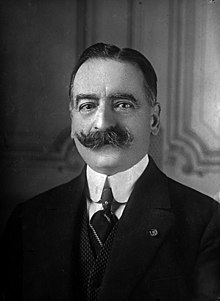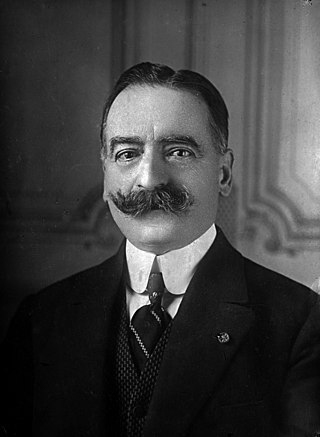Charles de Broqueville
Belgian politician From Wikipedia, the free encyclopedia
Comte Charles de Broqueville (French pronunciation: [ʃaʁl də bʁɔkvil]; 4 December 1860 – 5 September 1940) was the prime minister of Belgium, serving during World War I.
Comte Charles de Broqueville | |
|---|---|
 | |
| Prime Minister of Belgium | |
| In office 22 October 1932 – 20 November 1934 | |
| Monarchs | Albert I Leopold III |
| Preceded by | Jules Renkin |
| Succeeded by | Georges Theunis |
| In office 17 June 1911 – 1 June 1918 | |
| Monarch | Albert I |
| Preceded by | Frans Schollaert |
| Succeeded by | Gérard Cooreman |
| Personal details | |
| Born | Charles Marie Pierre Albert de Broqueville 4 December 1860 Postel, Belgium |
| Died | 5 September 1940 (aged 79) Brussels, Belgium |
| Political party | Catholic Party |

Before 1914
Summarize
Perspective
Charles de Broqueville was born into an old noble family with its roots in French Gascony. He was the son of Count Stanislas de Broqueville (1830–1919) and Claire de Briey (1832–1876). He received a private education from Catholic priest Charles Simon, from which he also learned Dutch. He married Berthe d'Huart (1864–1937), a granddaughter of Catholic statesman Jules Malou, through whom he gained further connections to politics.
First elected to the Chamber of Representatives in the 1892 election, he represented the arrondissement of Turnhout until June 1919. He was seen as part of de jonge rechterzijde (the young right-wing), and was politically a midway between Christian democracy and more traditional forms of conservatism.
The leader of Belgium's Catholic Party, he served as prime minister between 1911 and 1918 and headed the de Broqueville government.
Once it became clear that Germany intended to violate Belgian neutrality in August 1914, he oversaw Belgium's mobilization for war. Despite the mobilization, de Broqueville opposed King Albert I's proposal to deploy the Belgian Army along the German frontier in 1914 but strategically placed them throughout the country. He recognized that wartime support for Belgium depended upon its continued status as a nonprovocative neutral power.
During the war, de Broqueville was more willing to make concessions to the Flemish Movement than King Albert, in order to secure Belgian unity in the long term. He made several promises to the movements after the war, such as the Dutchification of Ghent University and better conditions for the Dutch language in standard education.
First World War
The German invasion of 1914 forced the Belgian government into exile at Le Havre. De Broqueville fought the King on the neutrality issue and so denied Belgium a full alliance with the Allied forces.
The opposition of the King critically weakened de Broqueville's stance among members of his cabinet. Consequently, he resigned as Foreign Secretary in January 1918 and as Prime Minister in May when he lost the support of his own party.
De Broqueville also served as minister in various departments:
- Minister of Railways and PTT (Posts, Telegraphs and Telephones) 1910–1912
- Minister of War 1912–1917
- Minister of Foreign Affairs 1917
- Minister of Reconstruction 1917–1918
- Minister of the Interior 1918–1919
- Minister of National Defence 1926–1930
Postwar
Later, Charles de Broqueville became Prime Minister a second time, serving from 22 October 1932 to 20 November 1934. He died on 5 September 1940, during the second German occupation of Belgium.
Titles, honours and arms
Titles
- 1867 – 1919: Baron Charles de Broqueville
- 1919 – 1920: Charles, Baron de Broqueville
- After 1920: Charles, Count de Broqueville
National honours
| Ribbon bar | Honour | Date |
|---|---|---|
| Croix de Guerre | ||
| Grand Cordon of the Order of Leopold | 1919[1] | |
| Minister of State |
Foreign honours
| Ribbon bar | Country | Honour | Date | Post-nominals |
|---|---|---|---|---|
| Knight Grand Cross of the Order of the Zähringer Lion | ||||
| Knight of the Order of the Dannebrog | ||||
| Grand Croix of the Légion d'honneur | ||||
| Croix de Guerre | ||||
| Grand Cross of the Order of the Redeemer | ||||
| Knight with the Collar of the Order of Pius IX | ||||
| Knight Grand Cross of the Order of Saints Maurice and Lazarus | ||||
| 1st class in the Order of the Rising Sun | ||||
| Grand Cross of the Order of the Oak Crown | ||||
| Knight Grand Cross of the Order of the Netherlands Lion | ||||
| Knight Grand Cross of the Portuguese Order of Christ (Portugal) | GCC | |||
| Knight Grand Cross of the Order of the Crown of Romania | ||||
| Knight of the Order of the White Eagle | ||||
| Knight Grand Cross of the Order of St Michael and St George | GCMG | |||
Arms
  |
|
See also
Notes
Sources
External links
Wikiwand - on
Seamless Wikipedia browsing. On steroids.
